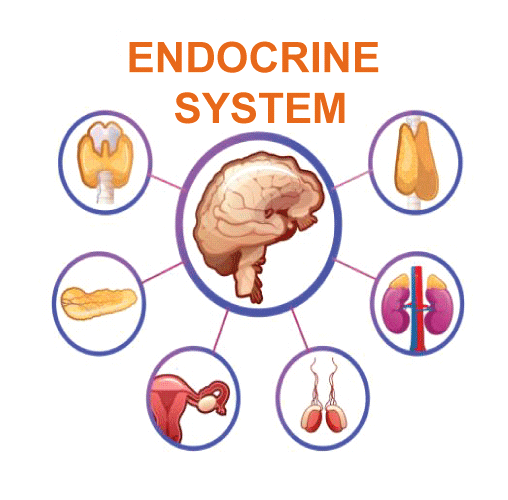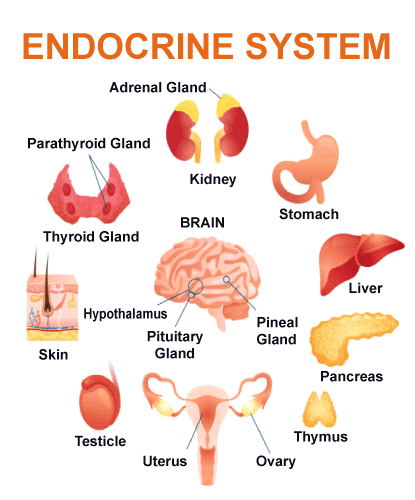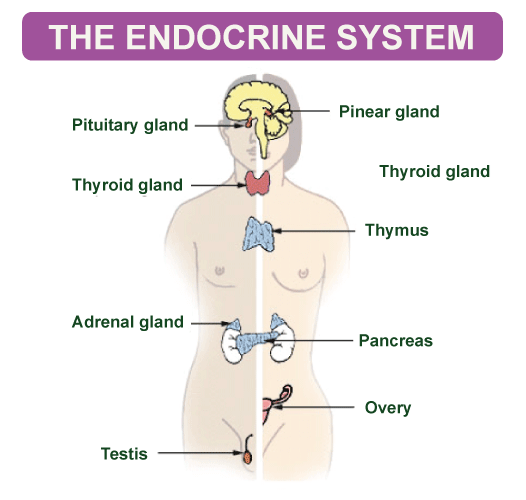Endocrine System DefinitionThe endocrine system is a complex network of glands and hormones that perform together to handle various bodily processes. These glands are ductless, meaning that they do not have tubes or channels for carrying their secretions towards target organs. Instead, the hormones made by these glands work as chemical messengers that transit via the bloodstream to reach their intended destinations. The primary endocrine glands contain the pituitary gland, thyroid gland, pancreas, adrenal gland, and gonads (ovaries and testes). Each of these glands produces specific hormones that play crucial roles in regulating different bodily processes such as growth and development, metabolism, tissue function, and reproductive processes. The article explores the different parts and structures of major endocrine glands. An Overview of the Endocrine System
It is an irrefutable fact that the endocrine system is a complex network of glands that are mainly accountable for creating and secreting hormones into the bloodstream. These glands, which include the pituitary gland, thyroid gland, adrenal gland, and pancreas, among others, work without ducts to transport their secretions towards target organs. Instead, hormones act as chemical messengers that can simultaneously affect many cells and tissues. Your body's endocrine system is made up of several other kinds of glands found throughout your body. Some are located in your brain, while others are found in your neck or abdomen. Each gland produces specific hormones that help regulate different bodily functions such as growth and development, metabolism, and reproductive processes. Hormones themselves are complex molecules that coordinate various functions within your body by carrying messages through your blood to other organs such as skin, muscles or other tissues. These signals tell your body what to do and when to do it - whether regulating blood sugar levels after eating a meal or responding to stress by releasing adrenaline. Mechanism of the Endocrine SystemThe endocrine system monitors hormone levels in the blood, which deliver messages by binding to target cells. The pituitary gland regulates hormone levels in the body through a process called homeostasis, which is similar to a thermostat. Hormones impact various bodily processes, such as below.
Hormone imbalances can lead to multiple health concerns such as high blood pressure, weight gain, and changes in mood, sleep, and behaviour. These imbalances occur when glands produce too much or too little hormone due to factors like illness, stress or certain medications. Different Parts of the Endocrine System
The endocrine system is composed of various organs, each with multiple functions. Some produce hormones, while others play important roles in other systems. These organs include the pituitary and pineal glands, thyroid and parathyroid glands, thymus, adrenals and pancreas located in various regions of the body. 1 Endocrine System in the BrainThe human body is a complex system that requires various organs to work together in order to maintain proper balance and homeostasis. One such set of organs is the hypothalamus, pituitary gland, and pineal gland. These three glands play essential roles in regulating other endocrine organs as well as circadian rhythms, which help to change the metabolic state of the body. The pineal gland is located near the centre of the brain, specifically within an area called the epithalamus. This small yet mighty gland plays a crucial role in producing melatonin which helps regulate sleep patterns and mood. On the other hand, the pituitary gland is situated very close to the hypothalamus and directly interacts with this organ for hormone production. The two glands work together seamlessly in regulating many different endocrine organs, including but not limited to gonads and adrenals. In fact, it can be said that the hypothalamus acts as a nodal point or central hub that integrates information from both nervous and endocrine systems before sending out appropriate responses through the anterior and posterior parts of the pituitary gland. It does so by collecting data from neurons throughout various parts of our bodies via nervous system pathways. 2 Endocrine System in the NeckThe thyroid and parathyroid glands are located in the neck. The thyroid gland has two lobes connected by a narrow strip of tissue, forming a butterfly-like shape, and is situated behind the thyroid cartilage. Each lobe is about 5 cm long, while the isthmus is around 1.25 cm long. Four parathyroid glands are usually positioned in front of each lobe of the thyroid gland, with each one weighing between 30-35 gms and measuring approximately 6x3x1 mm in size. Some individuals may have more than two pairs of parathyroid glands. 3 Endocrine System in the Human BodyThe thymus is an intriguing endocrine organ that plays a vital role in the immune system. It's located behind the sternum, between the lungs, and has two lobes. The pinkish-grey colour of this organ complements its function in developing and maturing T-cells. Its activity peaks during childhood and gradually shrinks after adolescence until it's replaced by fat. Before puberty, it can weigh almost 30 grams at its largest size. The adrenal glands are a crucial part of our endocrine system. They're located above each kidney and are also known as suprarenal glands because they position on top of the kidneys. These yellowish organs are surrounded by fat and can be seen just under the diaphragm, connected to it by connective tissue. The adrenals have an outer medulla and an inner cortex with distinct secretions and roles in our body. The pancreas serves as both a digestive and endocrine organ located near the duodenum behind the stomach. It produces digestive enzymes through exocrine cells. Structure of the Endocrine System
The endocrine system is a complex and fascinating network of glands that are widely distributed throughout the body. Unlike some other systems in the body, where their components may be concentrated in one area or organ. The parts of the endocrine system can function independently from each other to regulate and coordinate various bodily functions. For instance, let's take a look at how the pineal gland works. This tiny gland located deep within our brain responds to light received by our eyes and releases melatonin hormone accordingly. This action is entirely separate from that of reproductive endocrine glands, which respond to different signals altogether for a different outcome. However, it's important to note that some glands, like the thyroid and hypothalamus, play an essential role in controlling other glands' functions. These master control centres help coordinate overall actions across multiple organs within the body. When these glands release hormones into circulation, they create a cascade effect leading to several downstream effects caused by just one hormone's release. This complexity makes it clear why many consider the endocrine system as one of the most intricately structured systems in our bodies. Its ability to work independently while also coordinating with other organs through hormonal signalling pathways highlights its importance in maintaining optimal health throughout life. What Type of Conditions or Disorders affects the Endocrine System?The endocrine system can be affected by many conditions, resulting in health issues throughout the body. There are numerous common disorders associated with the endocrine system. 1 DiabetesDiabetes affects the body's energy utilization from food due to insufficient insulin production or improper insulin function. It occurs when the pancreas doesn't produce enough insulin. 2 Thyroid DiseasesThe thyroid gland can be affected by various conditions leading to either hypothyroidism or hyperthyroidism. Hypothyroidism is when the gland doesn't produce enough hormones, while hyperthyroidism produces too much hormone. 3 HypogonadismHypogonadism in men can lead to erectile dysfunction, memory and concentration problems, changes in muscle strength, and low sex drive. The lack of testosterone production by the testes can lead to a condition where there is not enough sex hormone in the body. 4 PCOS (Polycystic Ovary Syndrome)PCOS is a hormonal disorder that affects women, causing irregular periods, abnormal hair growth, acne and weight gain. It can lead to diabetes, metabolic syndrome and infertility. 5 OsteoporosisOsteoporosis is a condition where bones become brittle and weak due to low estrogen levels in women or low testosterone levels in men. It can also be caused by hyperparathyroidism, which leads to an overactive parathyroid gland. ConclusionIt is clear that the endocrine system plays a vital role in maintaining overall health by regulating essential bodily functions through hormone production and secretion. Understanding how this intricate system works can help you better manage any potential imbalances or issues related to hormonal regulation in the future. Understanding how your body's endocrine system works can help you make informed decisions about your health. By taking care of your body through good nutrition habits and regular exercise routines, you will be able to maintain optimal hormonal balance leading towards better overall well-being.
Next TopicFluid Definition
|
 For Videos Join Our Youtube Channel: Join Now
For Videos Join Our Youtube Channel: Join Now
Feedback
- Send your Feedback to [email protected]
Help Others, Please Share










